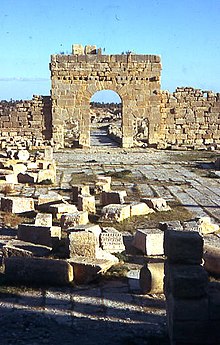


Ruins of Madauros
| |
|
Shown within Algeria | |
| Location | Algeria |
|---|---|
| Region | Souk Ahras Province |
| Coordinates | 36°04′36″N 7°49′12″E / 36.076667°N 7.82°E / 36.076667; 7.82 |
Madauros (Madaurus, Madaura) was a Roman-Berber city and a former diocese of the Catholic Church in the old state of Numidia, in present-day Algeria.
The birth of the city dates back to the 5th century BC under the aegis of the Punics.[1]
Madauros was made a Roman colony at the end of the first century and was famous for its "schola". A colony of veterans was established there; it was called Colonia Flavia Augusta Veteranorum Madaurensium under emperor Nerva.[2]
The city was fully Romanised in the fourth century, with a population of Christian Berbers who spoke mainly African Romance, according to Theodor Mommsen.[3]
Madauros was the see of a Christian diocese. There were three famous bishops of this diocese: Antigonus, who celebrated the 349 Council of Carthage; Placentius, who celebrated the 407 Council of Carthage and Conference of 411; and Pudentius, who was forced into exile alongside others present at the Synod of 484 because of the Vandal king Huneric.
The ruins of Madauros are close to the actual city of M'Daourouch (Arabic: مداوروش) in present-day Algeria. It is possible to see:
Apuleius, the author of the famous novel The Golden Ass, which is the only Latin novel to survive in its entirety,[4] was born in Madauros in the 120s.[5] Lucius, the (fictional) protagonist of the novel, is also from Madauros.[6]
Saint Augustine of Hippo studied in Madauros in the 4th century.[7]